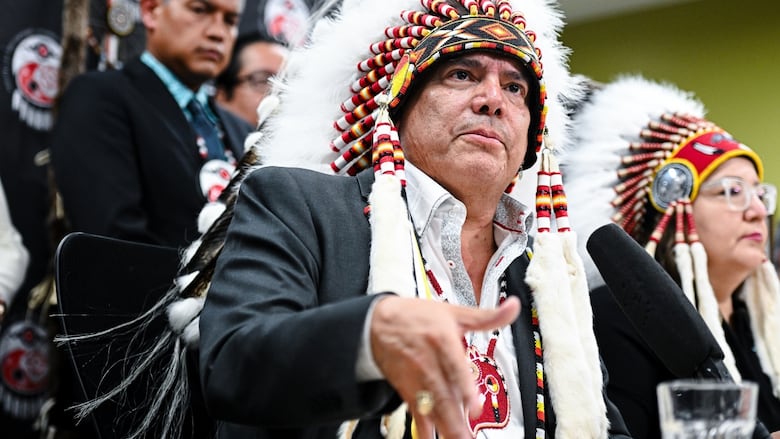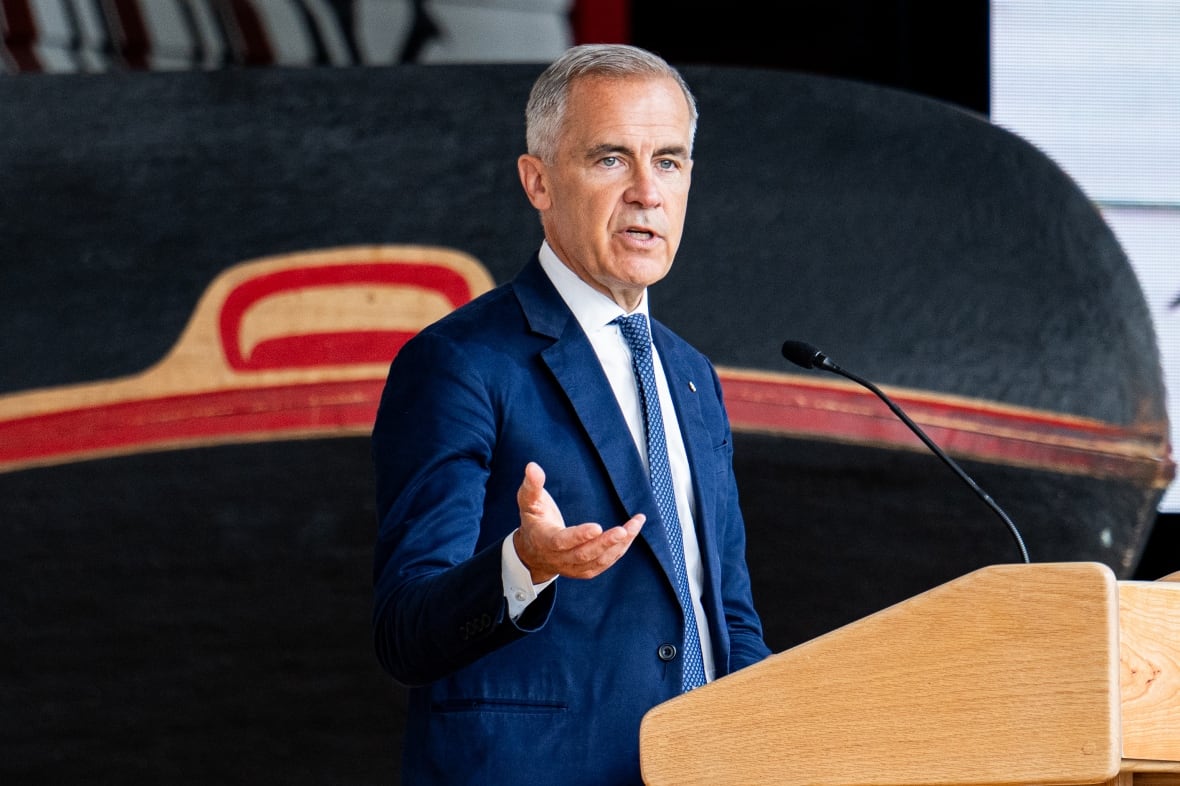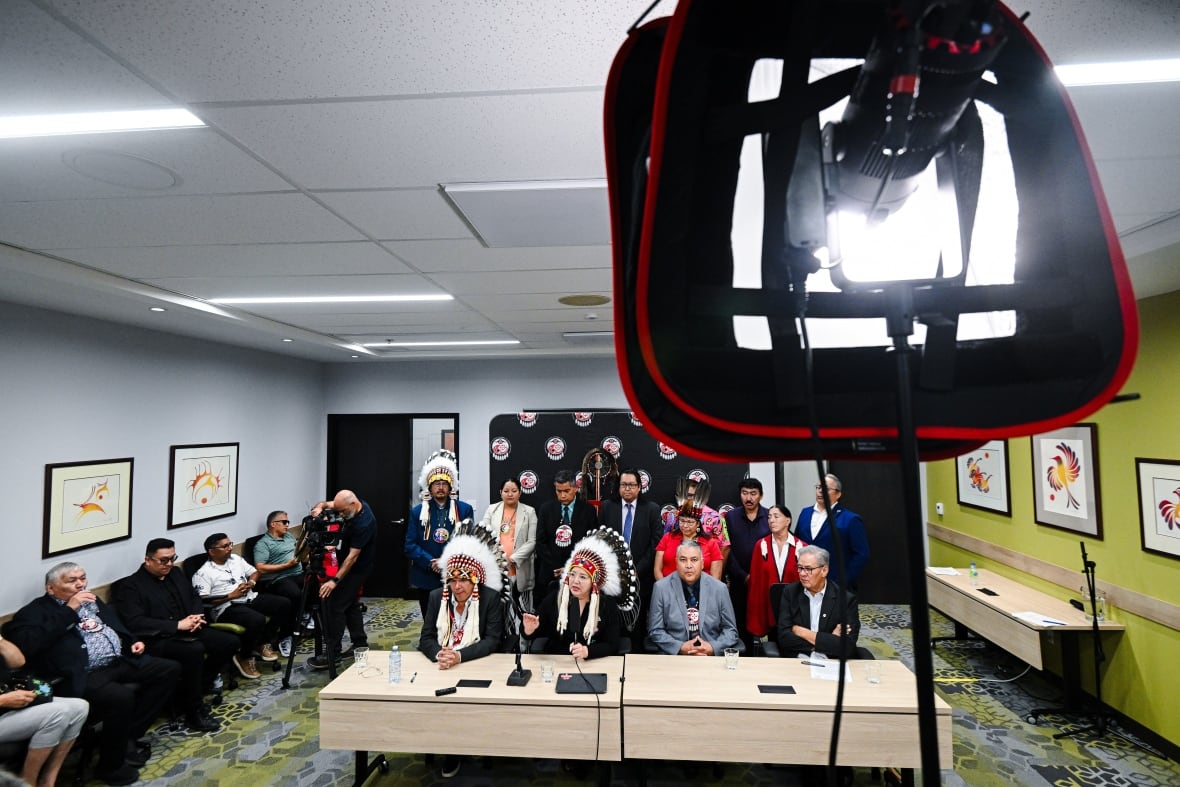Carney's Bill C-5 summit does little to allay concerns, say Manitoba chiefs
'Hard to trust any government after 150 years of eroded treaties': Manitoba Keewatinowi Okimakanak grand chief

A group of Manitoba chiefs have emerged from a summit with Prime Minister Mark Carney with many of their concerns remaining over his government's major projects legislation, and how its fast-tracked approval process could sidestep consultations and threaten Indigenous sovereignty.
Chiefs from the Prairie provinces held a joint press conference Thursday night in Ottawa after a day of discussions in neighbouring Gatineau, Que., with Carney, members of his administration and other leaders from some of the 600 First Nations from across the country.
"The prime minister said in one of his comments at the beginning that trust begins with acts and partnership, and that's something he has asked us to do — to trust him that he will honour those words," said Garrison Settee, grand chief of Manitoba Keewatinowi Okimakanak, which represents First Nations in northern Manitoba.
"It's hard to trust any government after 150 years of eroded treaties and eroded promises."
The second day of the two-day summit at the Canadian Museum of History in Gatineau wrapped Thursday with Settee, Assembly of Manitoba Chiefs Grand Chief Kyra Wilson and Angela Levasseur, chief of Nisichawayasihk Cree Nation, echoing concerns sounded by chiefs across Canada in the lead-up and during the passing of the Carney government's Bill C-5, which became law June 26.
The trio joined chiefs from Alberta and Saskatchewan in Ottawa at the end of the day to provide their impressions of how the back and forth with Carney and his administration went this week.

Carney had characterized the bill as a means of steeling Canada's economy against tariff and trade threats from the U.S.
Now the law of the land, C-5 enables the prime minister's cabinet to streamline approval processes of some major projects by skirting previous provisions, so long as those projects are deemed as being in the national interest.
The Liberals called the summit to allay fears expressed by some First Nations leaders over how that language could enable violations of treaty rights.
The prime minister has tried to reassure Indigenous leaders that consultation is a core part of the bill.
'1 discussion of many'
Grand Chief Wilson said it remains unclear how the government will adhere to Section 35 of the Constitution Act, 1982, which affirms the rights of Indigenous people to be consulted in the case of a project that could adversely impact them or their land.
First Nations do have a right to be consulted based on past Supreme Court rulings, though they do not have a final veto on whether a project may go ahead.
"We need to [know] from Canada how they're going to respect and recognize our laws," Wilson said.
"What is that going to look like? There are so many questions…. This meeting was not consultation, this meeting was a discussion, and it's going to be one discussion of many."
Settee said meaningful consultation honours treaties.
"This relationship has to be reset [to] the way it was originally intended from the beginning, when we signed our treaties to mutually benefit from the land and its resources, to share the wealth, to share the proceeds of any development project in our territories," he said.
"When we talk about consultation, the duty to consult, they stop there — they never talk about accommodation, and that's what I wanted to hear…. What is the process of accommodation when a project begins in our territory?"
Nisichawayasihk Cree Nation Chief Levasseur, whose community is west of Thompson, Man., raised concerns over the appearance Carney approves of forming new energy corridors, and how that could harm Indigenous lands.
She pointed to climate change and its connection to wildfires, as Manitoba is experiencing its worst fire season in decades. More than 12,000 evacuees, mostly from remote northern communities, are living in shelters, hotels and with loved ones right now.

Past hydroelectric diversions and mines in and around her home community of Nisichawayasihk have damaged drinking water and forest ecosystems, and she fears that could be repeated should the federal government ramp up energy and mineral operations.
Levasseur compared the relationship of First Nations and colonial governments to a toxic domestic partnership that will take time and good will to heal.
"I would love nothing more as a First Nations chief to say that I trust you or I can trust you, but as you said today, prime minister, today was not consultation. Today was merely engagement…. You are just getting to meet us and know us," she said.
"Forming a healthy and mutually respectful relationship is going to be a long, hard road … and we're going to need to see some serious showings of good faith."'
Days before this week's summit, nine First Nations in Ontario filed a legal challenge against Ontario's own Bill 5 law and Carney's federal C-5, hoping to have a judge find both unconstitutional.
More from CBC Manitoba:

